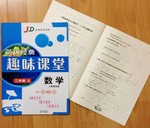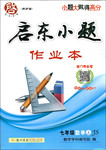题目内容
7. There is a __________(continent) climate in that place.
7. continental

 黄冈经典趣味课堂系列答案
黄冈经典趣味课堂系列答案 启东小题作业本系列答案
启东小题作业本系列答案
阅读理解
A
Florence, Italy Who should go: Art lovers; Renaissance historians; leather handbag shoppers with high credit limits. When to go: Spring or fall. Travellers usually avoid summer in Florence. |
Paris, France Who should go: Starving artists; Henry Miler fans; traditional food lovers. When to visit- Spring is the best time. That's what they all say, anyway. Autumn isn't bad, either, and I'd rather be rooting around the south of France in search of truffles(松露)in autumn. Summer in Paris isn't bad, really. |
Amsterdam T Holland Who should go: Lovers of Dutch Masters (artists I mean, like Rem-brandt, not cigars) ; bicyclists―it's a bike city in a flat land. When to go:It can rain at any time in Amsterdam? but that's not a rea?son for not visiting this fascinating city. Off season tourists will be rewarded with good enough weather to stick around. Summer is good for sun lovers. |
Madrid, Spain Who should go: Night owls―Madrid never sleeps; art lovers―the Prado is second only to the Louvre in presenting serious art; party-goers. When to go: Spring, when days are warm and the nights are pleasantly cool. Demand for outside eating and drinking starts becoming stronger in March or April. Street life peaks(达到髙峰)in June, then slows in July and August as the temperature peaks. Autumn is also good, although you'll risk some rain. |
Venice, Italy Who should go : Romantic dreamers who like walking through automo?bile-free streets ; your mother (she'll want you to take her there, trust me); almost anyone who wants to see something really different and romantic. When to go: February is the time when the famous Venice Carnival is held and the weather is usually cold and foggy―perfect weather for Venice. Summer? A large number of tourists in shorts and whiny children ruin the atmosphere. You'll greatly enjoy yourself there in spring and early fall. |
1. What do the cities Florence? Paris, Amsterdam and Madrid have in common?
A. They are all great cities for female shoppers.
B. They are all famous for their traditional food.
C. They are all great cities for art lovers.
D. They are all famous for cigars.
2.If you are interested in looking for truffles in the south of France, you should go there in____________ .
A. early spring B. autumn
C. summer D. late spring
3. What advice would the writer probably give you if you go to visit Amsterdam?
A. To avoid going there in summer.
B. To avoid going around there by bike.
C. To take some credit cards with high credit limits.
D. To take an umbrella with you whenever you go out.
4. The underlined part "Night owls" in the section about Madrid probably refers to people who like____________ .
A. night life B. serious art
C. drinking wine D. organizing parties
5.According to the section about Venice, the writer would agree that .
A. summer isn't a good time to visit the city
B. the city is not a good choice for romantic lovers
C. streets in the city are usually too crowded with cars
D. people avoid going there in February because of the weather